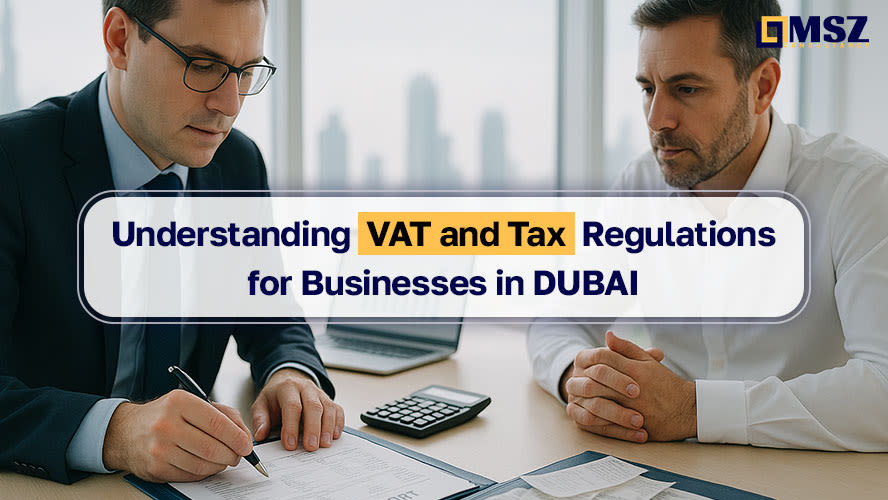
Dubai's tax framework has matured in lockstep with its rise as a global business hub. The implementation of VAT and Corporate Tax reflects a modern, transparent fiscal system designed for long-term growth and international alignment.
Cut through the complexity.
This guide breaks down the essentials of Dubai's tax landscape- from VAT and CT to Free Zones- so you can operate with confidence and clarity.
1. VAT in Dubai: Compliance and Recovery
The introduction of VAT in 2018 in Dubai transformed the UAE's fiscal landscape. It applies to most goods and services, making it essential to comply for all businesses operating in their respective jurisdiction in Dubai.
Key Points to Remember About VAT:
- VAT Rate: The standard VAT rate is 5%. This is considerably lower than in most places globally.
- Taxable Goods and Services: Businesses must charge VAT on Taxable Supplies (which include all goods or services sold). Businesses, however, can recover VAT via VAT returns on business-related purchases.
- Zero-Rated VAT Supplies: Some goods and services are titled zero-rated because they are taxable at 0%. These include the export of goods and international transport services. Although there is no VAT charged, businesses can still recover the VAT paid on the associated costs.
- Exempt Supplies: Exemptions from VAT on supplies include financial services, residential properties (under certain circumstances), and limited healthcare and educational services.
VAT Registration Requirements
- Mandatory Registration: only applicable to turnover of AED 375,000 or above.
- Voluntary: You may choose to register to reclaim VAT on businesses between AED 187500-375000
- Optional: While not required, Registration can be a strategic choice for new businesses with high upfront costs (Below AED 187,500) to recover input VAT immediately.
Filing VAT Returns Businesses must file for VAT returns with the FTA (Federal Tax Authority) on a quarterly or monthly basis. The due date for filing returns is the 28th of every month, following the end of the tax period. Failure to comply could lead to strict penalties.
2. Corporate Tax: Navigating the New 9% Regime
Dubai's business landscape has evolved with the introduction of a federal Corporate Tax.
Key CT Details:
- Taxable income below AED 375,000 benefits from a 0% corporate tax rate with a massive incentive for growth and reinvestment in the early stages of business.
- For businesses exceeding the threshold, a 9% rate is applicable on profits above 375,000.
Impact on Free Zones:
Dubai's Free Zones will continue to provide limited tax exemptions. However, if corporate tax applies, then Free Zones will have to take into consideration the corporate tax structure going forward, particularly for businesses where their tax exemption rights have either expired or are not eligible.
What This Means for Your Business:
Companies must factor in the new corporate tax in their financial planning, as it will affect their overall profit and tax strategy, especially if they are a growing company that is likely to exceed AED 375,000.
3. Excise Tax: Duties on Harmful Products
The UAE's Excise Tax targets a narrow category of goods with proven health and environmental risks. Currently, taxable products include tobacco, energy drinks, and carbonated or sugary beverages.
Excise Tax Rates:
- Tobacco Products: 100%
- Energy Drinks: 100%
- Soft Drinks/Carbonated Beverages: 50%
Impact on Businesses:
If your company sells these goods, you already know excise taxes hit hard. They directly shape your final prices and cut into your margins.
Staying compliant isn't optional - you'll need to register with the FTA for excise tax, file regular returns, and keep detailed records. Getting it wrong means penalties; getting it right means staying in control of your bottom line.
4. Customs Duties: Navigating Import and Export Fees
Because Dubai is a global trade hub, knowing customs duties is essential for any business that is engaged in imports and exports.
Custom Duties in Dubai:
Most imported goods have 5% customs duty rate. Exceptions apply to certain goods - consult the customs authority to ascertain the customs duty applicable to your goods.
If your business is situated in a Free Zone, there may be exceptions regarding customs duty on goods imported for re-export. However, any goods sold to the domestic market will attract customs duties.
What this means for your business:
Customs duties directly impact your bottom line. If you import goods, you must know the rules: free zone exemptions often only apply to goods destined for re-export. Selling those same items locally incurs standard duties. Clarify product classifications, free zone protocols, and sales channels upfront to avoid unexpected costs and maintain smooth operations.
5. Withholding Tax (WHT) and Double Taxation Agreements (DTA)
- No Withholding Tax: Dubai imposes no WHT on outbound payments for dividends, interests, or royalties, keeping international business smooth with no barriers.
- Double Taxation Protection: A wide-reaching DTA network ensures that income is not taxed twice, providing fiscal predictability for cross-border trade & operations.
What This Means for Businesses:
For businesses with international operations, the absence of WHT and the availability of DTAs allow Dubai to be a great option for global activities. WHT and DTAs significantly reduce the risk of double taxation and, therefore, improve cash flow by removing tax barriers across borders.
6. Free Zones: Strategic Hubs for Tax Efficiency
Dubai's Free Zones are a favorite among global companies and entrepreneurs. The advantages and tax benefits offered to businesses operating in Dubai Free Zones are more than substantial to outweigh any expenses.
__The benefits of operating in Free Zones are as follows: __
- No corporate tax (for a span of time)
- 100% foreign ownership
- No taxes on import/export
- 100% repatriation of profits and capital
__Examples of Free Zones in Dubai: __
- Dubai International Financial Center (DIFC)
- Jebel Ali Free Zone (JAFZA)
- Dubai Silicon Oasis (DSO)
What Does This Mean for Your Business?
Free zones offer excellent benefits, but it is important to remember that each one has its own rules and specifications. Find the right match for your industry and business goals- an important step towards setting your business to flourish.
7. Remaining Compliant: Key Steps to Avoid Penalties
Staying on the right side of the FTA isn't just about compliance- it's about peace of mind. Keep your VAT, Corporate Tax, and Excise Tax filings accurate and on time, and you'll avoid unnecessary penalties while focusing on what matters- growing your business.
Key Compliance Tips:
- Registration is mandatory for all businesses with an annual turnover exceeding AED 375,000.
- VAT returns must be filed monthly or quarterly.
- Keep Proper Records for all VAT transactions.
- Corporate Tax reporting- if applicable- you need to file tax returns and pay tax on profits that exceed AED 375,000.
Conclusion: A Strategic Approach to Tax Planning in Dubai
To establish yourself in Dubai, understanding its tax landscape and the dynamic changes is important. Knowing how the rules around VAT and CT can help ensure compliance and avoid any unnecessary headaches, as you capitalize on growth, and keep profits protected.
It is not just about compliance - it is about growing a reliable, competitive business with confidence.
MSZ provides clarity and strategic tax advice. Ready to secure your advantage? Call us now at +971 52 544 1248 or book a consultation.

Mohammed Sultan Zubair
CEO - MSZ Corporate Services
Mohammed Sultan Zubair is a seasoned business consultant specializing in company formation and regulatory compliance in the UAE and Saudi Arabia. With over 15 years of experience, he has guided entrepreneurs, SMEs, and multinational firms through the complexities of regional business laws and market entry strategies. His deep understanding of local licensing, taxation, and free zone structures ensures clients make informed, strategic decisions. Mohammed Sultan Zubair regularly contributes insights on corporate setup, investment trends, and regional economic developments.





